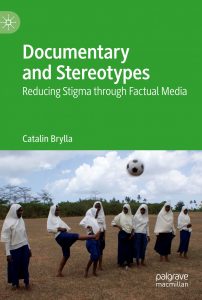 Documentary and Stereotypes: Reducing Stigma through Factual Media (Palgrave 2023) and its accompanying web toolkit by Principal Lecturer Catalin Brylla are available.
Documentary and Stereotypes: Reducing Stigma through Factual Media (Palgrave 2023) and its accompanying web toolkit by Principal Lecturer Catalin Brylla are available.
This book studies how social stigma and prejudice can be reduced through factual media, including documentaries, news, reality TV, advertisements and social media videos. It is intended for researchers and media makers who want to increase social inclusion and diversity through strategic on-screen representations. Using models from social psychology, media studies and cultural studies, it explains how harmful social boundaries can be reduced in relation to ethnicity, culture, age, disability, gender, sexual orientation, religion and many other social categories.
The first part explains the function of stereotypes in social perception and cognition, whether we meet a person in real life or watch a TV documentary. The second part establishes a classification system for stigmatising media stereotypes, and it proposes a methodology to analyse these in narrative and audio-visual representations. The third part introduces a framework of methods to reduce stigmatising stereotypes and foster social inclusion. These are based on experiencing the perspective of screen characters and the strategic intersection of multiple social identities.
The book and web toolkit have been widely disseminated:
Society of Cognitive Film Studies Conference 2024 (University of North Carolina, Wilmington)
Masterclass: Catalin Brylla and Edward Schiappa in conversation about Reducing Prejudice through Documentary: The Parasocial Contact Hypothesis (University College London)
Intersectional Media Representation Workshop at the Festival of Media Production 2024 (Bournemouth University)
Inclusive Filmmaking Workshop (School of Creative Practice, Queensland University of Technology)
Reducing Prejudice through Documentary Practice (Steve Tisch School of Film and Television, Tel Aviv University)
Reducing Disability Stigma through Intersectional Media Representations (Centre of Culture and Disability Studies, Liverpool Hope University)













 SPROUT: From Sustainable Research to Sustainable Research Lives
SPROUT: From Sustainable Research to Sustainable Research Lives BRIAN upgrade and new look
BRIAN upgrade and new look Seeing the fruits of your labour in Bangladesh
Seeing the fruits of your labour in Bangladesh Exploring Embodied Research: Body Map Storytelling Workshop & Research Seminar
Exploring Embodied Research: Body Map Storytelling Workshop & Research Seminar Marking a Milestone: The Swash Channel Wreck Book Launch
Marking a Milestone: The Swash Channel Wreck Book Launch ECR Funding Open Call: Research Culture & Community Grant – Application Deadline Friday 12 December
ECR Funding Open Call: Research Culture & Community Grant – Application Deadline Friday 12 December MSCA Postdoctoral Fellowships 2025 Call
MSCA Postdoctoral Fellowships 2025 Call ERC Advanced Grant 2025 Webinar
ERC Advanced Grant 2025 Webinar Update on UKRO services
Update on UKRO services European research project exploring use of ‘virtual twins’ to better manage metabolic associated fatty liver disease
European research project exploring use of ‘virtual twins’ to better manage metabolic associated fatty liver disease